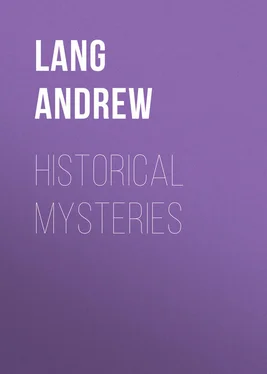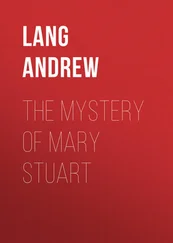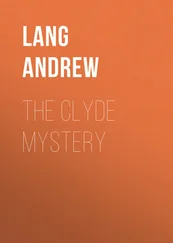Andrew Lang - Historical Mysteries
Здесь есть возможность читать онлайн «Andrew Lang - Historical Mysteries» — ознакомительный отрывок электронной книги совершенно бесплатно, а после прочтения отрывка купить полную версию. В некоторых случаях можно слушать аудио, скачать через торрент в формате fb2 и присутствует краткое содержание. Жанр: foreign_antique, foreign_prose, на английском языке. Описание произведения, (предисловие) а так же отзывы посетителей доступны на портале библиотеки ЛибКат.
- Название:Historical Mysteries
- Автор:
- Жанр:
- Год:неизвестен
- ISBN:нет данных
- Рейтинг книги:5 / 5. Голосов: 1
-
Избранное:Добавить в избранное
- Отзывы:
-
Ваша оценка:
- 100
- 1
- 2
- 3
- 4
- 5
Historical Mysteries: краткое содержание, описание и аннотация
Предлагаем к чтению аннотацию, описание, краткое содержание или предисловие (зависит от того, что написал сам автор книги «Historical Mysteries»). Если вы не нашли необходимую информацию о книге — напишите в комментариях, мы постараемся отыскать её.
Historical Mysteries — читать онлайн ознакомительный отрывок
Ниже представлен текст книги, разбитый по страницам. Система сохранения места последней прочитанной страницы, позволяет с удобством читать онлайн бесплатно книгу «Historical Mysteries», без необходимости каждый раз заново искать на чём Вы остановились. Поставьте закладку, и сможете в любой момент перейти на страницу, на которой закончили чтение.
Интервал:
Закладка:
To Mother Wells's the girl was taken on February 1, in what a company! The coach, or cab, was crammed full, some friends walked, several curious citizens rode, and, when Elizabeth arrived at the house, Nash, the butler, and other busybodies had made a descent on it. The officer with the warrant was already there. Lyon, Aldridge, and Hague were with Nash in a cab, and were met by others 'riding hard,' who had seized the people found at Mrs. Wells's. There was a rabble of persons on foot and on horse about the door.
On entering the doorway the parlour was to your left, the house staircase in front of you, on your right the kitchen, at the further end thereof was a door, and, when that was opened, a flight of stairs led to a long slit of a loft which, Nash later declared, did not answer to Elizabeth's description, especially as there was hay, and, before Chitty, Elizabeth had mentioned none. There was a filthy kind of bed, on which now slept a labourer and his wife, Fortune and Judith Natus. Nash kept talking about the hay, and one Adamson rode to meet Elizabeth, and came back saying that she said there was hay. By Adamson's account he only asked her, 'What kind of place was it?' and she said, 'A wild kind of place with hay in it,' as in the neighbours' version of her first narrative. Mrs. Myers, who was in the coach, corroborated Adamson.
The point of the sceptics was that till Adamson rode back to her on her way to Wells's house she had never mentioned hay. They argued that Adamson had asked her, 'Was there hay in the room?' and that she, taking the hint, had said 'Yes!' By May 1754 Adamson and Mrs. Myers, who was in the cab with Elizabeth, would believe that Adamson had asked 'What kind of place is it?' and that Elizabeth then spoke, without suggestion, of the hay. The point would be crucial, but nobody in 1754 appears to have remembered that on February 21, three weeks after the event, at the trial of Mother Wells, Adamson had given exactly the same evidence as in May 1754. 'I returned to meet her, and asked her about the room. She described the room with some hay in it … an odd sort of an empty room.'
Arriving at Mother Wells's, Elizabeth, very faint, was borne in and set on a dresser in the kitchen. Why did she not at once say, 'My room was up the stairs, beyond the door at the further end of the room'? I know not, unless she was dazed, as she well might be. Next she, with a mob of the curious, was carried into the parlour, where were all the inmates of the house. She paid no attention to Mrs. Wells, but at once picked out a tall old woman huddled over the fire smoking a pipe. She did this, by the sceptical Nash's evidence, instantly and without hesitation. The old woman rose. She was 'tall and swarthy,' a gipsy, and according to all witnesses inconceivably hideous, her underlip was 'the size of a small child's arm,' and she was marked with some disease. 'Pray look at this face,' she said; 'I think God never made such another.' She was named Mary Squires. She added that on January 1 she was in Dorset – 'at Abbotsbury,' said her son George, who was present.
In 1754 thirty-six people testified to Mary Squires's presence in Dorset, or to meeting her on her way to London, while twenty-seven, at Enfield alone, swore as positively that they had seen her and her daughter at or near Mrs. Wells's, and had conversed with her, between December 18, 1752, and the middle of January. Some of the Enfield witnesses were of a more prosperous and educated class than the witnesses for the gipsy. Many, on both sides, had been eager to swear, indeed, many had made affidavits as early as March 1753.
This business of the cross-swearing is absolutely inexplicable; on both sides the same entire certainty was exhibited, as a rule, yet the woman was unmistakable, as she justly remarked. The gipsy, at all events, had her alibi ready at once; her denial was as prompt and unhesitating as Elizabeth's accusation. But, if guilty, she had enjoyed plenty of time since the girl's escape to think out her line of defence. If guilty, it was wiser to allege an alibi than to decamp when Elizabeth made off, for she could not hope to escape pursuit. George Squires, her son, so prompt with his 'at Abbotsbury on January 1,' could not tell, in May 1754, where he had passed the Christmas Day before that New Year's Day, and Christmas is a notable day. Elizabeth also recognised in Lucy Squires, the gipsy's daughter, and in Virtue Hall, the two girls, dark and fair, who were present when her stays were cut.
After the recognition, Elizabeth was carried through the house, and, according to Nash, in the loft up the stairs from the kitchen she said, in answer to his question, 'This is the room, for here is the hay I lay upon, but I think there is more of it.' She also identified the pitcher with the broken mouth, which she certainly mentioned to Chitty, as that which held her allowance of water. A chest, or nest, of drawers she declared that she did not remember. An attempt was made to suggest that one of her party brought the pitcher in with him to confirm her account. This attempt failed; but that she had mentioned the pitcher was admitted. Mrs. Myers, in May 1754, quoted Elizabeth's words as to there being more hay exactly in the terms of Nash. Mrs. Myers was present in the loft, and added that Elizabeth 'took her foot, and put the hay away, and showed the gentlemen two holes, and said they were in the room when she was in it before.'
On February 7, Elizabeth swore to her narrative, formally made out by her solicitor, before the author of Tom Jones , and Mr. Fielding, by threats of prosecution if she kept on shuffling, induced Virtue Hall to corroborate, after she had vexed his kind heart by endless prevarications. But as Virtue Hall was later 'got at' by the other side and recanted, we leave her evidence on one side.
On February 21-26 Mary Squires was tried at the Old Bailey and condemned to death, Virtue Hall corroborating Elizabeth. Mrs. Wells was branded on the hand. Three Dorset witnesses to the gipsy's alibi were not credited, and Fortune and Judith Natus did not appear in court, though subpœnaed. In 1754 they accounted for this by their fear of the mob. The three sceptics, Nash, Hague, and Aldridge, held their peace. The Lord Mayor, Sir Crispin Gascoyne, who was on the bench at the trial of Squires and Wells, was dissatisfied. He secured many affidavits which seem unimpeachable, for the gipsy's alibi , and so did the other side for her presence at Enfield. He also got at Virtue Hall, or rather a sceptical Dr. Hill got at her and handed her over to Gascoyne. She, as we saw, recanted. George Squires, the gipsy's son, with an attorney, worked up the evidence for the gipsy's alibi ; she received a free pardon, and on April 29, 1754, there began the trial of Elizabeth Canning for 'wilful and corrupt perjury.'
Mr. Davy, opening for the Crown, charitably suggested that Elizabeth had absconded 'to preserve her character,' and had told a romantic story to raise money! 'And, having by this time subdued all remains of virtue, she preferred the offer of money, though she must wade through innocent blood' – that of the gipsy – 'to attain it.'
These hypotheses are absurd; her character certainly needed no saving.
Mr. Davy then remarked on the gross improbabilities of the story of Elizabeth. They are glaring, but, as Fielding said, so are the improbabilities of the facts. Somebody had stripped and starved and imprisoned the girl; that is absolutely certain. She was brought 'within an inch of her life.' She did not suffer all these things to excite compassion; that is out of the question. Had she plunged into 'gaiety' on New Year's night, the consequences would be other than instant starvation. They might have been 'guilty splendour.' She had been most abominably misused, and it was to the last degree improbable that any mortal should so misuse an honest quiet lass. But the grossly improbable had certainly occurred. It was next to impossible that, in 1856, a respectable-looking man should offer to take a little boy for a drive, and that, six weeks later, the naked body of the boy, who had been starved to death, should be found in a ditch near Acton. But the facts occurred. 2 2 Paget, p. 332.
To Squires and Wells a rosy girl might prove more valuable than a little boy to anybody.
Интервал:
Закладка:
Похожие книги на «Historical Mysteries»
Представляем Вашему вниманию похожие книги на «Historical Mysteries» списком для выбора. Мы отобрали схожую по названию и смыслу литературу в надежде предоставить читателям больше вариантов отыскать новые, интересные, ещё непрочитанные произведения.
Обсуждение, отзывы о книге «Historical Mysteries» и просто собственные мнения читателей. Оставьте ваши комментарии, напишите, что Вы думаете о произведении, его смысле или главных героях. Укажите что конкретно понравилось, а что нет, и почему Вы так считаете.












